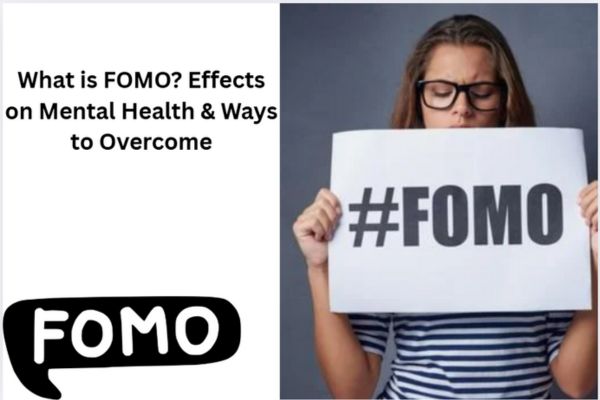In today’s digital age, many people feel anxious that others are living more exciting or fulfilling lives. This emotion, called FOMO (Fear of Missing Out), is a growing issue that affects mental health and overall well-being.
Rooted in our natural need for social connection, FOMO can lead to stress, anxiety, and dissatisfaction. This article explains what FOMO is, why it happens, how it impacts mental health, and how to overcome it.
What Is FOMO?
FOMO (Fear of Missing Out) is the anxiety or apprehension that others might be having rewarding experiences without you. It’s the uneasy feeling of being left out of enjoyable, beneficial, or meaningful activities that others are participating in, often affecting one’s mental health and emotional well-being.
The concept was first popularized by Dr. Dan Herman, a marketing strategist, in 1996, and later gained academic attention when Dr. Andrew Przybylski and colleagues at Oxford University published a paper in 2013 exploring the psychological and mental health implications of FOMO.
The Psychology Behind FOMO
At its core, FOMO is rooted in social comparison theory, proposed by psychologist Leon Festinger in 1954. This theory suggests that people determine their own worth by comparing themselves to others. When these comparisons show others as “doing better,” it can lead to dissatisfaction and anxiety.
1. Social Connection and Belonging
Humans are wired for social belonging, a basic psychological need described by Abraham Maslow in his hierarchy of needs. When we perceive that others are connecting, achieving, or enjoying life more than we are, it threatens our sense of inclusion. FOMO arises as a psychological alarm signaling that we might be socially disconnected.
2. Reward Systems and Dopamine
From a neurological perspective, FOMO is linked to the dopamine reward system in the brain. Every time we check social media and see likes, notifications, or new content, our brain releases dopamine, a neurotransmitter associated with pleasure and motivation. This constant reinforcement creates a loop that keeps us checking, scrolling, and engaging to avoid missing something exciting.
3. Cognitive Biases
FOMO also involves certain cognitive distortions:
- Availability heuristic: We overestimate how often others are having great experiences because those moments are the ones most frequently shared online.
- Confirmation bias: We focus on evidence that confirms our belief that others have better lives.
- Negativity bias: WWe dwell on what we lack rather than appreciating what we have, often searching for ways to change your life and feel more fulfilled.
The Role of Social Media in FOMO
While FOMO existed long before the digital age, social media has amplified it exponentially.
1. Highlight Reels vs. Reality
People tend to share curated versions of their lives — vacations, parties, promotions — while leaving out mundane or negative experiences. When others view these highlight reels, they compare them to their own full, unfiltered lives, leading to feelings of inadequacy.
2. Constant Connectivity
With smartphones always within reach, users are bombarded with updates, stories, and notifications that make disengagement difficult. This “always-on” culture encourages comparison and reinforces the idea that everyone else is more active, connected, and fulfilled.
3. Social Validation
Likes, shares, and comments serve as public markers of approval. The pursuit of this validation can make users anxious when their own posts receive less engagement, further intensifying the sense of missing out or not being “good enough.”
4. The Algorithm Effect
Social media algorithms are designed to keep users engaged by showing them content that triggers emotional responses, often envy, curiosity, or desire. This contributes to digital addiction and deepens FOMO-driven behavior.
The Psychological and Emotional Effects of FOMO
The consequences of FOMO go beyond mild anxiety; they can impact both mental health and behavioral well-being.
1. Increased Anxiety and Stress
People experiencing FOMO often feel constant tension or restlessness. They may worry about being left out, which can lead to generalized anxiety, irritability, and difficulty focusing.
2. Depression and Low Self-Esteem
When comparisons on social media consistently make us feel inferior, our self-image suffers. Over time, repeated exposure to others’ “perfect” lives can contribute to low self-esteem and even symptoms of depression.
3. Sleep Problems and Burnout
Likes, shares, and comments serve as public markers of approval. The pursuit of this validation can make users anxious when their own posts receive less engagement, further intensifying the sense of missing out or not being “good enough.” This constant comparison can even impact social health, affecting how we form and maintain meaningful relationships.
4. Reduced Real-Life Satisfaction
Ironically, by focusing on what others are doing, individuals experiencing FOMO become less satisfied with their own experiences. Even when participating in activities, they might struggle to be fully present, constantly wondering what else might be happening elsewhere.
FOMO in Different Contexts
FOMO manifests differently depending on the context — personal, academic, or professional.
1. Social FOMO
This involves the fear of missing social gatherings, events, or opportunities to connect. It’s particularly common among young adults and college students.
2. Career FOMO
Professionals may experience anxiety over colleagues’ achievements, promotions, or networking opportunities. This can lead to overworking or job dissatisfaction.
3. Financial and Investment FOMO
In the financial world, FOMO investing occurs when individuals buy assets (like stocks or cryptocurrencies) simply because others are profiting, often leading to impulsive decisions and losses.
4. Academic FOMO
Students might feel left behind if peers are excelling or participating in programs they are not. This can cause academic stress and overcommitment. Teaching children healthy coping strategies early, such as effective mental health activities for kids, can help them build resilience and reduce anxiety related to comparison.
How to Overcome FOMO?
Overcoming FOMO requires awareness, self-compassion, and behavioral adjustments. Here are evidence-based strategies to help manage and reduce it.
1. Practice Mindfulness
Mindfulness involves being fully present and accepting each moment without judgment. Studies show mindfulness meditation can reduce anxiety and increase emotional regulation. Techniques such as deep breathing, body scanning, or guided meditation help calm the mind and reduce impulsive checking behaviors.
2. Limit Social Media Use
Set specific times to check social media — for example, 15 minutes in the morning and evening — and avoid mindless scrolling. Apps that track screen time or temporarily block social platforms can be helpful tools.
3. Focus on Gratitude
Gratitude practices shift focus from what’s missing to what’s present. Keeping a gratitude journal or reflecting on daily positives enhances contentment and counters comparison-based thinking.
4. Redefine Success and Happiness
Remember that online metrics, likes, followers, or achievement, are not valid measures of worth. Define success according to your values, not others’ highlights. Just as a Health Information Exchange centralizes important data for better decision-making in healthcare, centralizing your personal values can guide choices and reduce anxiety caused by external comparisons.
5. Engage in Real-Life Connections
Spend time with family, friends, and communities offline. Face-to-face interactions strengthen genuine bonds and reduce reliance on virtual validation.
6. Embrace JOMO (Joy of Missing Out)
The antidote to FOMO is JOMO, the Joy of Missing Out. It means finding peace and happiness in disconnecting, enjoying solitude, and valuing what truly matters. This mindset encourages people to appreciate rest, personal growth, and authentic experiences without comparison.
FOMO in Marketing and Consumer Behavior
Interestingly, marketers have long recognized the power of FOMO in influencing behavior. FOMO marketing taps into the human desire not to be left out by using urgency and scarcity tactics.
Common examples include:
- “Only 3 seats left!”
- “Limited-time offer, ends tonight!”
- “Join thousands of satisfied customers!”
These triggers activate the same psychological fear that drives social FOMO. When used ethically, they can motivate decision-making; when overused, they can create stress and mistrust. Modern ethical marketing strategies aim to use FOMO responsibly, emphasizing genuine value and transparency rather than manipulation.
Just as the importance of health education guides people to make informed decisions about their well-being, ethical FOMO marketing should provide clear, responsible information to help consumers act wisely.
Final Thoughts
FOMO is far more than just a social buzzword. It’s a modern manifestation of timeless human emotions, the desire for connection, validation, and belonging.
While social media and digital culture have amplified these feelings, awareness and self-care can transform how we respond to them. By practicing mindfulness, gratitude, and presence, we can move from FOMO to JOMO, from anxiety to appreciation.
Ultimately, life is not a race to keep up with others, but a journey of self-discovery and contentment. When we learn to value where we are, rather than worry about where we’re not, we reclaim the joy of being fully present in our own lives.
Frequently Asked Questions
FOMO, or Fear of Missing Out, is the anxiety that others are having rewarding experiences without you, often affecting mental health and well-being.
FOMO is caused by social comparison, the need for connection, and social media exposure, which amplify feelings of inadequacy and anxiety.
FOMO can increase stress, low self-esteem, and burnout, while also impacting social health by making it harder to form meaningful connections.
Overcome FOMO by practicing mindfulness, limiting social media, focusing on gratitude, engaging in real-life connections, and embracing JOMO.
Yes, FOMO affects children and students, but teaching coping strategies like effective mental health activities for kids can reduce anxiety and build resilience.



